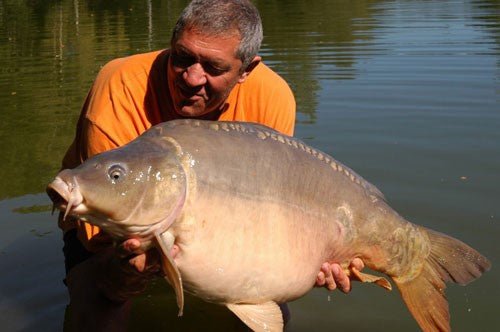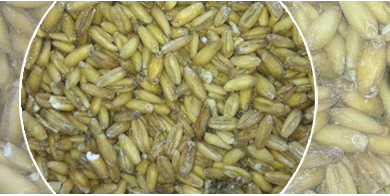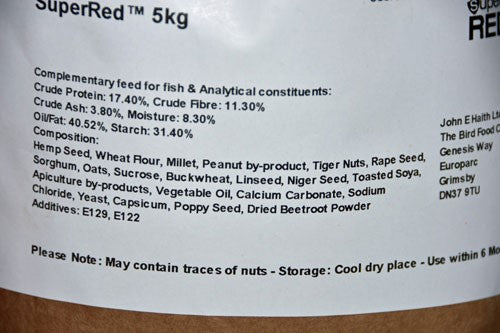
Fishing Preparations Part Three: Final Steps for Success
Share
OK…I know it's now May, but this Blog was started in April but I only managed to finish it today…I DO actually go fishing, too, you know!
So, let's take a look at the final part of my pre-season preparations.

It is always a good idea to check the state of the batteries you use in your gear. This includes alarms head torches, bivvy light and bait boats (among others). If you use Lipo batteries in your bait boat they should be charged up anyway as these types of battery should always be stored in a charged state.
When they are not likely to be used for two or three months, I take the batteries out of my alarms, or simply disconnect them in the case of PP3 batteries. Then when I am ready to start fishing again, I just re-connect them.

You should check the condition of your main line every year. Most decent monofilament lines will last a season or more but I tend to err on the side of caution, replacing the line on my reels each year. I have used most of the top brands of line down the years but for some reason, I always come back to the monos offered by Gardner Tackle. I have just renewed the 15lb GT-HD mono after using it on and off for most of 2017/8. It is very abrasion-resistant, it sinks well, and while some anglers have mentioned that it has a few knot and memory problems I have not found these to be an issue.

If you prefer to use a fluorocarbon line - for its density if not for its casting qualities! - then now is a good time to back-to-back the line. Give it a good dollop of line lube when you are done as this will put a few yards on your casts and keep the line clean. The lube also seems to prevent debris from sticking to the line when it is in the water. This is very handy as many fluoros end up looking like a clothesline underwater if they have been out all night.

This is Gardner Tackle's 16lb Mirage, an excellent fluorocarbon line that I have had on the reels for four years. Unlike monos, fluoros do not deteriorate with age nor are they weakened by sunlight. The Mirage is my go-to line on venues where braid main lines are not allowed but I want to use the slack line/light running lead method. For preference, I would use a braid but many venues ban braids for some unknown reason.

Of course, a fluoro line does restrict the distance one can cast; I don't think anyone would say otherwise, but that's the price you pay if you want a really dense heavy line that will sink like a brick. Incidentally, Mirage is actually made for Gardner Tackle in the renowned Fluorocarbon line factory of Seaguar…Say no more!

Talking of braids: If you use braid on your reels then check the final few yards of line. Make sure it is not frayed or nicked. I tend to strip off the final four or five yards of braid anyway, just to be on the safe side. I have found that all the braids I have used lose some of their colour after a season's use, and while this may not be a problem for most anglers, I think some may be a little discouraged by this discolouration.

However, there is no need to ditch it just because the colour has faded. Just take a couple of permanent markers - I like back and green - and apply a covering of ink to the line while it sits on the spool. The ink penetrates down into the layers of the line to about 50m and thus adds a sort of camo effect in the water, breaking up the outline to a certain extent.

Is this actually necessary? Good question! I think it is more a matter of confidence rather than practicalities. After all, the observation made by the late, great Rod Hutchinson (who favoured a dark or even a black mono or braid), was that it was better to use lines that the fish could see rather than one they could not see - fluoros for instance. He reckoned carp were far less bothered by the sight of the line stretching across their field of vision but he had experienced carp spooking if they felt less visible line on their body. This was summed up nicely by the big fella: "It's not what they can see but what they can feel that matters."

Check any long-term stored bit of tackle that might have deteriorated in store such as mats, slings and nets. Replacement landing net mesh does not cost a fortune. So, a small investment at the start of the season may well pay dividends.

I am a sucker for trying out different hook patterns. OK, sometimes I chose the wrong hook pattern for a particular rig or maybe I get the size wrong. It's a fine balancing act but a bit of trial and error on well-stocked runs waters usually indicates the way forward. The new range of Rigga hooks from Gardner includes this very sharply patterned CVR hook. These have proved very effective for me, both for bottom baits and for pop-ups.

In fact, they are, in my opinion, a better choice for a Ronnie Rig than the Mugga, which is widely suggested as the first-choice pattern for this particular rig.

They are also, again in my opinion, the perfect hook for the 360 Rig, much more effective in my experience than the more commonly used long, curved shank patterns.

A new company to arrive on the carp hook market is JPrecision the brainchild of Jamie Peters. I was put onto these by my mate Bill Cottam who is ultra-fussy about his hooks. If Bill rates a hook then you can bet your boots, they will be good. I have not used them yet but I am planning on doing so soon on my first trip of the year across the Channel. So far, I have only bought the Longshank Curve pattern in sizes 4 & 6 and a few forthcoming nights will be spent rig tying in front of the telly. One point that must be stressed: these hooks are all hand sharpened by Jamie himself and frankly I have yet to find a sharper hook.
Now let's look at particle baits, nuts and ground baits, but first here are a few Q & As for you:
Q. What are the Top Two microparticles in the world?
A. Hempseed and Oat Groats, that's it, full stop, no question!
Q. Which of those two is the best?
A. There is no 'best'. They sit equally at the top of the tree.
Q. Is there anything better than hemp or groats.
A. Yes…a blend of the two!

Prepare your hempseed in your preferred way. As you can see here, not all of the seeds have split. Frankly, I am not bothered if they split or not and I actually prefer them to remain whole as they retain all their oil content.

Once the hempseed is cooked to your liking, add an equal amount of dry groats to the still-boiling water in the pan.

This will lower the temperature of the water to bring up the heat so as to return the water to the boil.

Once the water is boiling hard turn off the heat and put a lid on the pan.

Allow the pan and its contents to cool down. This will allow time for the groats to absorb the cooling hemp water and swell up properly. It is now ready to use. Alternatively, if you are looking ahead, you might like to make the blend in bulk and freeze it in small individual packages.

I usually prepare the hemp/groats blend well in advance in 500g batches. These are then frozen ready for use throughout the season. On the bag, I mark the date the batch was made and just prior to freezing I add a tablespoon of top-quality sea salt. I then shake the bag so as to distribute the salt evenly. It is now ready for the freezer.

Talking of salt, here's a little tip for you: When making up groundbait balls sprinkle sea salt liberally over them. This is SuperRed stiffened with water and an amino acid-rich soy sauce.

As discussed previously, I use a great deal of paste in my day to day carp fishing, so I make sure the freezer is always well stocked with my favourite paste made with a blend of CLO and Red Factor. I also add a hefty dose of Feed Stimulants' Liver Powder and Green Lipped Full Fat Mussel Concentrate.

The paste blend needs no eggs in the recipe as it can be formed using water, however, I do like to include 25ml of each of these two liquid foods to the water to add still more attraction. The Squid Hydro is one of the most effective additives I have used, while the Oyster Extract knocks spots off the widely recommended oyster sauce that you find in the delis and oriental stores.

I always have a plentiful supply of my favourite boiled bait in the freezer, usually, my own Robin Red & Fishmeal base mix tweaked with a few attractors such as citric acid and Betaine HCl. I pre-mix the base in bulk and label it accordingly.

As I write I am in the middle of my preparations for my first French trip of the year so now is the time to prepare my frozen baits to their most effective level. First, I sieve off any frozen remnants that may have accumulated inside the bag while the baits were in the freezer.

Next, I put the bait in drying trays.

The next task is to prepare a potent glug using a glycerol-based attractor liquid together with the two Feed Stimulants' product mentioned previously. This will both preserve the shelf life of the bait, boosting the attraction at the same time.

I create the glug by mixing 50ml of the Squid Hydro and the Oyster Extract together in a separate bottle.

Now the bait is placed in a large bucket and the glug is poured over it. Shake the bucket to distribute the glug evenly.

Finally, the bait is bagged into 500g lots, which I seal using a bag sealer. By dividing the bait into small, handy packages, I can take out of the freezer only the bait I think I will need for the session. I like my bait to be as fresh as possible and hate the idea of waste.

The glugged baits are kept frozen until needed.

It always amazes me that some anglers still dismiss shelf life boilies out of hand, when in fact modern shelf life baits are in most cases as good as anything you can make yourself. In fact, unless you are of a scientific bent with an inquisitive mind, always looking (and seldom finding!) for the ultimate bait, you could do a lot worse than to stick to shelf life baits. I have lost count of the number of big carps I have caught on 'selfies' and I would use any of the baits shown in the photo in a heartbeat.

I first used Dynamite Baits' Frenzied Tigers in Romania in 2003, putting four jars in my carry-on luggage. It's a darn good job I did as my bulk bait, 50kg of Trigga shelfies, was hijacked at customs. Luckily these fabulous bottles of carp sweets came to my rescue. Nowadays I seldom go on a trip without at least one bottle of Frenzied Tigers.

Finally, I prepare my complimentary bait, which is usually my trusty blend of hempseed and groats. However, I also love to use what I call 'soft' groundbait and by far the best is SuperRed, and the bait I put together back in 2001 when I first started working with Haith's. Just look at the list of ingredients in there…!
I didn't think I would ever make a better groundbait than SuperRed but when I was asked to create a similar three-in-one mix I decided to try to create a nut-based groundbait using Haith's nut ingredients. Eventually after extensive testing by Brian, Adam and myself I came up with a recipe that is every bit as good as SuperRed…some say it is even better. It is called super nut and it follows the same 3 in 1 pattern of its big brother. It can be used as a groundbait, a Method Mix, or if you grind it down to a fine powder it makes a fantastic boilie…just add eggs.
I invariably take a bag of each of the Supers when I do a long session as they compliment each other splendidly. As you can see SuperNut on the left is quite a bit coarser than SuperRed, which is down to the crushed nuts used in the recipe. Ideally, the bait should be soaked in a little water overnight. Not too much, just enough initially to make a sludge.

You will find that it will stiffen quite a bit overnight (or after a 12-hour soak) and can then be formed into groundbait balls or used on a Method feeder.

Last but by no means least would like to mention glycerin once again, as I know how much it annoys one particular bait baron. Take a look around my blogs to find more info about using this sticky slightly sweet liquid to extend the shelf life of your homemade baits. Here are some of the original RR & Fishmeal chunks that were glugged in glycerin back in November 2015. OK, they may not look in the full flush of youth, but they still smell great and still catch fish.

So now I am all ready for my late spring, summer and autumn fishing, looking forward to catching a lump or two like this. I know you will have a great season, especially if you are wise enough to get on Haith's Baits gear!
Written by Ken Townley
